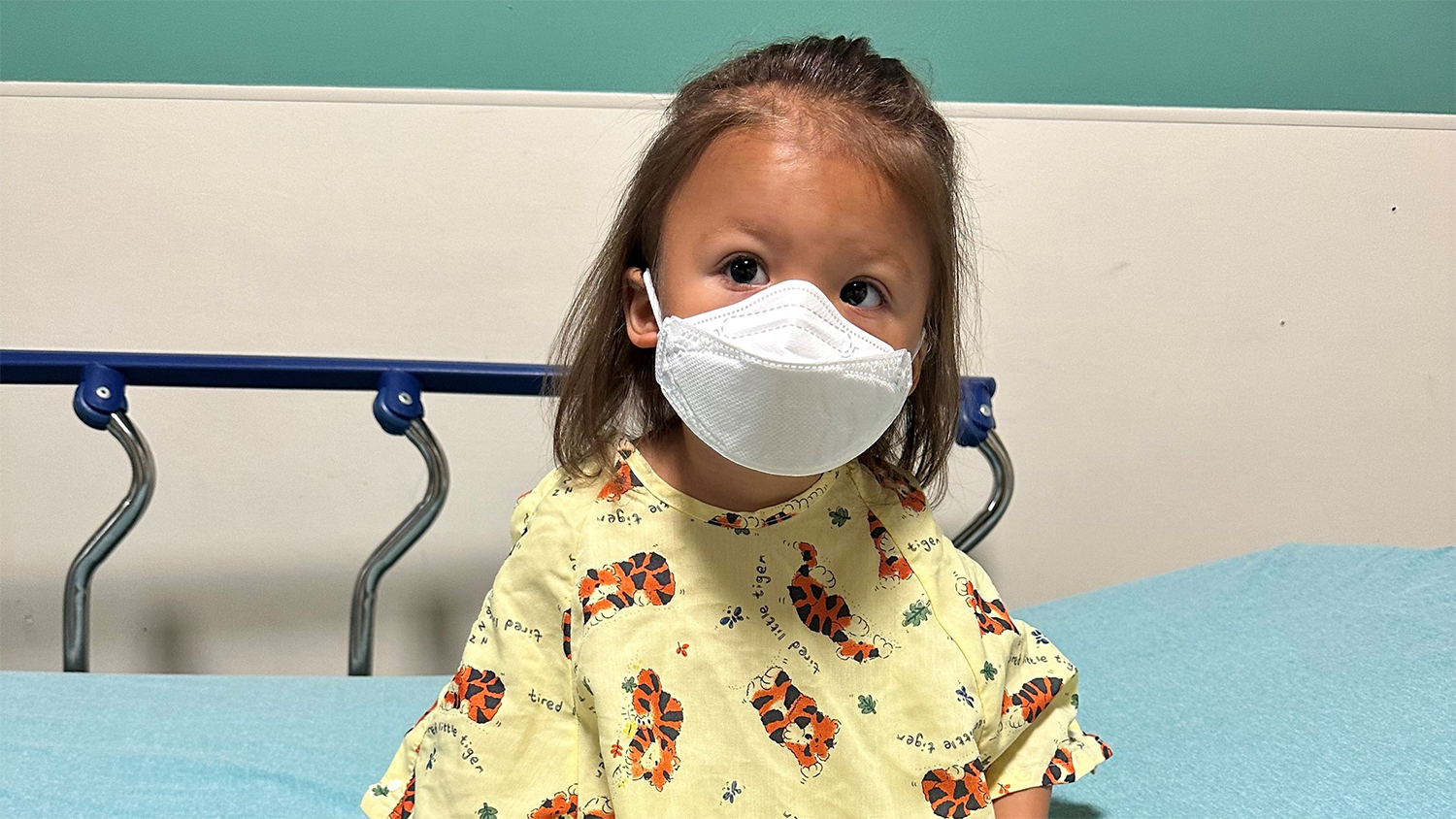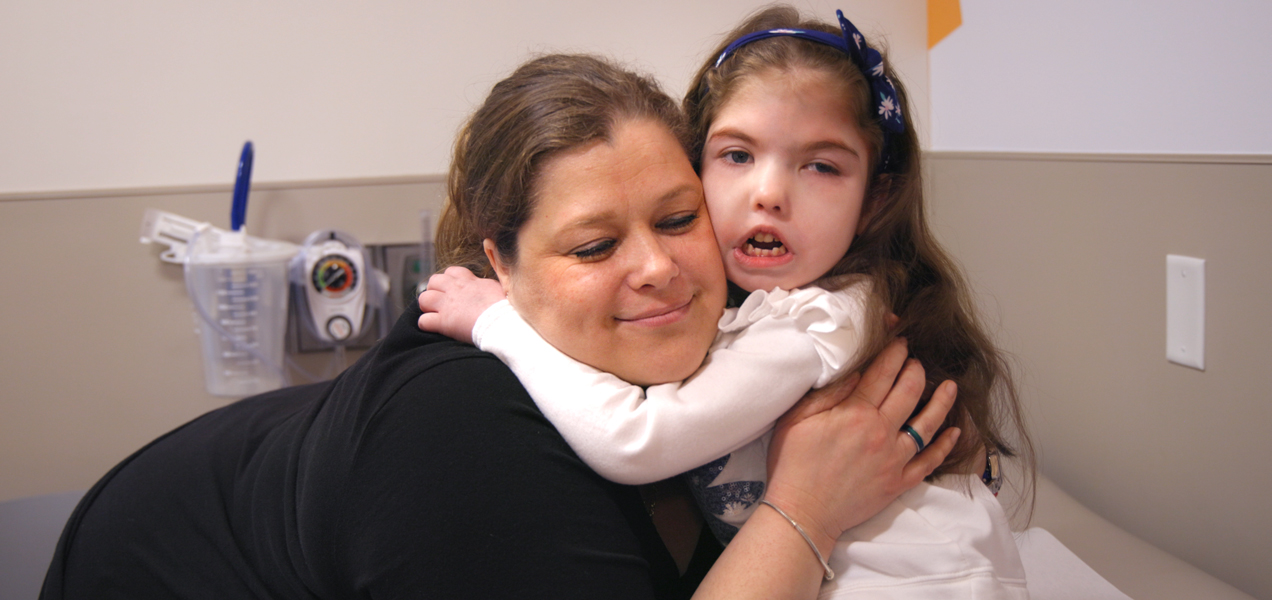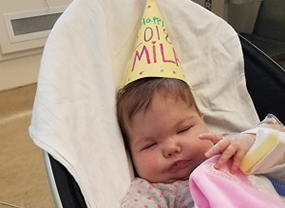Condition
Pediatric Hirschsprung's Disease
What You Need to Know
Hirschsprung's disease is a rare birth defect that affects the nerve cells in the large intestine.
Key Symptoms
Symptoms of Hirschsprung's vary by age (see more below), but common symptoms include:
- Constipation
- Loss of appetite
- Watery stool or diarrhea
- Delayed growth
Diagnosis
Diagnostic tests for Hirschsprung's disease include:
- Abdominal X-ray
- Barium enema
- Anorectal manometry
- Biopsy of the rectum or large intestine
Treatment
Treatment depends on your child’s symptoms, age, general health and the severity of their condition. Below are possible surgical options for Hirschsprung's disease:
- Pull-through surgery
- Ostomy surgery
- Colostomy
- Ileostomy
About Hirschsprung's Disease
What is pediatric Hirschsprung's disease?
Hirschsprung's disease is a rare birth defect. It affects the nerve cells in the large intestine. These nerve cells control the muscles that move food and waste, or stool, through the large intestine. The large intestine is the last part of the digestive tract.
The large intestine can become partly or fully blocked, causing it to grow larger than normal. This can cause constipation, swelling, pain and infection.
A child is more at risk for Hirschsprung's disease if there is a family history of the disorder. Some genetic syndromes, such as Down syndrome, are also linked with the disorder.
Boys are more likely to have Hirschsprung's disease than girls.
What are the symptoms of Hirschsprung's disease in children?
Recognizing Hirschsprung's Disease Symptoms
Most babies with Hirschsprung's disease have symptoms in the first few weeks of life. In some cases, only a small part of the intestine may be affected. Some children may not show symptoms for up to several months, while others become ill very quickly.
In Newborns
Infants with Hirschsprung's disease often display early symptoms, but these may not always be obvious. Some children have the disorder and only show symptoms later on, around toddler age.
Each child’s symptoms may vary. Symptoms in newborns may include:
- Not having a bowel movement in the first 48 hours of life
- Slow swelling or bloating of the belly
- Vomiting green or brown fluid
- Fever
- Diarrhea (a sign of enterocolitis)
In Babies
Babies who don’t show early symptoms may also have:
- Constipation that gets worse over time
- Loss of appetite
- Slow or delayed growth
- Small, watery, bloody stools
- Loss of energy
In Toddlers
Symptoms in older children include:
- Sepsis
- Severe constipation
- Loose and watery stools (enterocolitis)
- Loss of appetite
- Delayed growth (failure to thrive)
What is Hirschsprung associated enterocolitis?
Symptoms of Hirschsprung's disease may seem like other health problems. If you notice your child having trouble with bowel movements for any reason, contact your pediatrician. Delaying could lead to a serious condition called enterocolitis.
Enterocolitis Requires Immediate Treatment
Because of the lack of normal nerve cells in the intestine, digested food and stool can’t move forward through that part of the digestive tract. The large intestine becomes blocked with stool. Your child will be constipated or unable to have normal bowel movements. Bacteria are allowed to grow in this area of the bowel that is not moving, and this can lead to a severe infection called Hirschsprung associated enterocolitis.
Symptoms of enterocolitis include:
- Fever
- Swollen belly
- Belly pain
- Vomiting
- Diarrhea
- Bleeding from the rectum
- Lack of energy
Call your child’s healthcare provider right away if your child has any signs of enterocolitis. It's important to note that enterocolitis may occur before or after surgery for Hirschsprung's disease.
How does Hirschsprung's disease manifest in infants?
During pregnancy, a baby’s nerve cells form along the intestines. They begin in the mouth and end in the anus. In babies with Hirschsprung's disease, the nerve cells don’t grow past a certain part of the large intestine. Experts don’t know why this happens.
In most cases, only the end parts of the colon (large intestine) are affected. Without these nerve cells, the muscles can’t move food and waste through that part of the large intestine. When it can't move forward, stool stays in the large intestine, causing constipation.
How is Hirschsprung's disease diagnosed in children?
Diagnosing Hirschsprung's disease can be difficult because its symptoms are similar to other conditions, such as irritable bowel syndrome and allergy to the protein in milk. However, delays in diagnosis and treatment can lead to complications like enterocolitis.
Your child’s healthcare provider will do an exam and take a health history. They will ask questions about constipation and bowel movements. Other tests may be done to find out if your child has Hirschsprung's disease. These tests may include:
- Abdominal X-ray. This test may show a lack of stool in the large intestine or near the anus. It can also show if part of the large intestine is bulging. The bulging is caused by blocked stool.
- Contrast enema. This X-ray exam checks the large intestine for any problems. Your child is given a contrast fluid which coats the colon which can then be seen on an X-ray. The contrast material is put into a tube and inserted into your child’s rectum as an enema. An X-ray of the belly will show any narrowed areas or any blockages. It will also show if the intestine is bulging above a blockage.
- Anorectal manometry. This test is most often used for older children. A small tube is put into the rectum to check how well the rectal muscles are working. If the muscles don't relax, it may be a sign of Hirschsprung's disease.
- Biopsy of the rectum or large intestine. A tiny piece of the large intestine is removed. It is checked under a microscope to see if any nerve cells are missing.
The results of these tests will help your child's pediatric team make a diagnosis. They will talk with you about the best way to treat your child's Hirschsprung's disease.
Treatment Approaches for Pediatric Hirschsprung's Disease at Children's National
Treatment will depend on your child’s symptoms, age and general health. It will also depend on how severe the condition is.
What is the treatment for Hirschsprung's disease in children?
Surgical Intervention for Pediatric Intestinal Disease
Hirschsprung's disease is treated with surgery called a pull-through procedure that is done in one or two stages:
- One stage. A surgeon removes the part of the large intestine that lacks nerve cells. When possible, the healthy part that is left is connected to the anal opening.
- Two stages. Very rarely, a child who is very sick from Hirschsprung's disease may first need ostomy surgery. With ostomy surgery, the diseased part of the large intestine is removed. The end of the healthy intestine is moved to an opening made in the belly, called a stoma, which passes stool to an external bag. Once healthy enough, the pull-through surgery is performed.
After ostomy surgery, children tend to feel better because they are able to pass stool and gas with less discomfort. The bag must be emptied several times a day and is temporary.
What are the types of ostomies needed for pediatric intestinal disease?
Ostomies provide a solution for stool to exit until your child is ready to undergo reconstructive surgery. There are two main types of ostomies used in treating Hirschsprung's disease:
- Colostomy. A surgical procedure that creates a stoma (opening) for the colon to excrete waste in a small bag located outside of the body. In the case of an anorectal malformation most babies will need a temporary colostomy within the first few days of life. In the case of Hirschsprung's disease this is very rarely needed. The colostomy will ensure that the baby can properly pass stool, help normalize digestion, and greatly reduce the risk of infection.
- Ileostomy. An ileostomy involves connecting a part of the small intestine to a surgical opening in the abdomen that allows feces to move outside of the body into a small pouch. If the ileostomy is temporary, surgery will be performed to connect the large and small intestine. An ileostomy may be performed if your child has a malformation of the large intestines that interferes with waste exiting the body.
An ostomy may be temporary or permanent. It depends on how much of the intestine must be removed. If it is short-term, the surgeon will connect the healed intestine to the anus and sew the stoma closed.
More About Treatment Options
Learn more about treatment options for children with Hirschsprung's disease.
Persistent Symptoms
Some children may experience persistent symptoms after surgery for Hirschsprung's disease.
What can I expect during my child's hospital stay after a Hirschsprung's disease treatment?
After surgery, your child will likely stay in the hospital for approximately four to seven days. Some children may need to stay longer, depending on the severity of their condition. During this time, your child will need plenty of rest and will be given an IV to help them stay hydrated.
Prior to leaving the hospital, your medical team will advise you on how to care for your child once they are home, which will include:
- How to keep abdominal incisions clean and dry
- Learning to pay attention to the skin around your child’s anus, which will require special care to keep it from becoming irritated after passing stool multiple times a day
- Understanding what topical medications should be used to provide relief against a rash
- Recognizing constipation issues so you can have your child follow a healthy diet, eat plenty of fiber, take medications such as laxatives if necessary, and stay hydrated
- Knowing the signs of enterocolitis, which remains a risk after surgery
- Learning how to perform colon irrigations if needed, which can help prevent or treat enterocolitis
As your child heals, they should begin a bowel management program to facilitate and maintain the best possible bowel function as well as to minimize the possibility of soiling. Follow-ups with your child's pediatric team will help ensure that they are progressing as expected and monitor any possible issues.
How can I care for my child after a Hirschsprung's disease treatment?
Long-Term Management and Care for Children with Hirschsprung’s Disease
Your child’s bowel function may be affected after surgery. The most common long-term problems include bowel control and leaking stool, constipation and infections. These post-surgical problems depend on how much of the intestine lacked nerve cells and how much of it was removed.
Children with Temporary Ostomies
Children who are able to have their ostomy closed may have short-term problems after the closure, including:
- Stools may be frequent and loose at first. To prevent skin irritation, try cleaning the anal area carefully to remove stool. Also, try using diaper rash creams or lotions.
- Children may have trouble sensing the need to have a bowel movement. The urge to have a bowel movement is greater after eating. It may help to have your child spend 10 minutes after meals on the toilet.
- Some children have problems with bowel movements because the anal opening is tight. A special method called rectal dilation may help. Your child's healthcare provider can teach you this method if it’s right for your child.
Children with Permanent Ostomies
Children with permanent ostomies will have to learn to adjust to living with them. This means learning how to take care of the stoma and how to change the ostomy pouch. Living with an ostomy can be very hard. A special nurse called an ostomy nurse, can help your child learn how to care for the ostomy. The nurse can also provide emotional support and encouragement.
Other Potential Long-Term Challenges
Children who had a large part of the intestine removed may have long-term problems. The digestive process can be affected. Nutrients and fluids are absorbed from food in the small intestine. Removing a large segment of the intestine can prevent a child from getting enough nutrients and fluids. Children can have problems with poor digestion, slow growth and infection. Your child may need to eat and drink more to get enough nutrients and fluid.
It's okay if you don't feel fully confident in caring for your child after their surgery. Talk with your child's healthcare provider and ask questions. They will be able to provide information and resources to help you feel more comfortable.
Care Following a Pull-Through Procedure for a Child with Hirschsprung's Disease
Learn how to care for your child after their pull-through procedure. Before performing any of steps from this video, consult your child's pediatrician.

Administer a Rectal Irrigation at Home
Rectal irrigations flush a safe liquid through the colon to help clean stool out and to prevent infection. The goal of this video is to teach you to perform rectal irrigations at home with your child.

Schedule an Appointment
Our pediatric specialists provide personalized care for your child’s physical, mental and emotional health needs. Meet the providers who treat Hirschsprung's disease and schedule an appointment today.
Patient Stories
Departments that Treat Hirschsprung's Disease
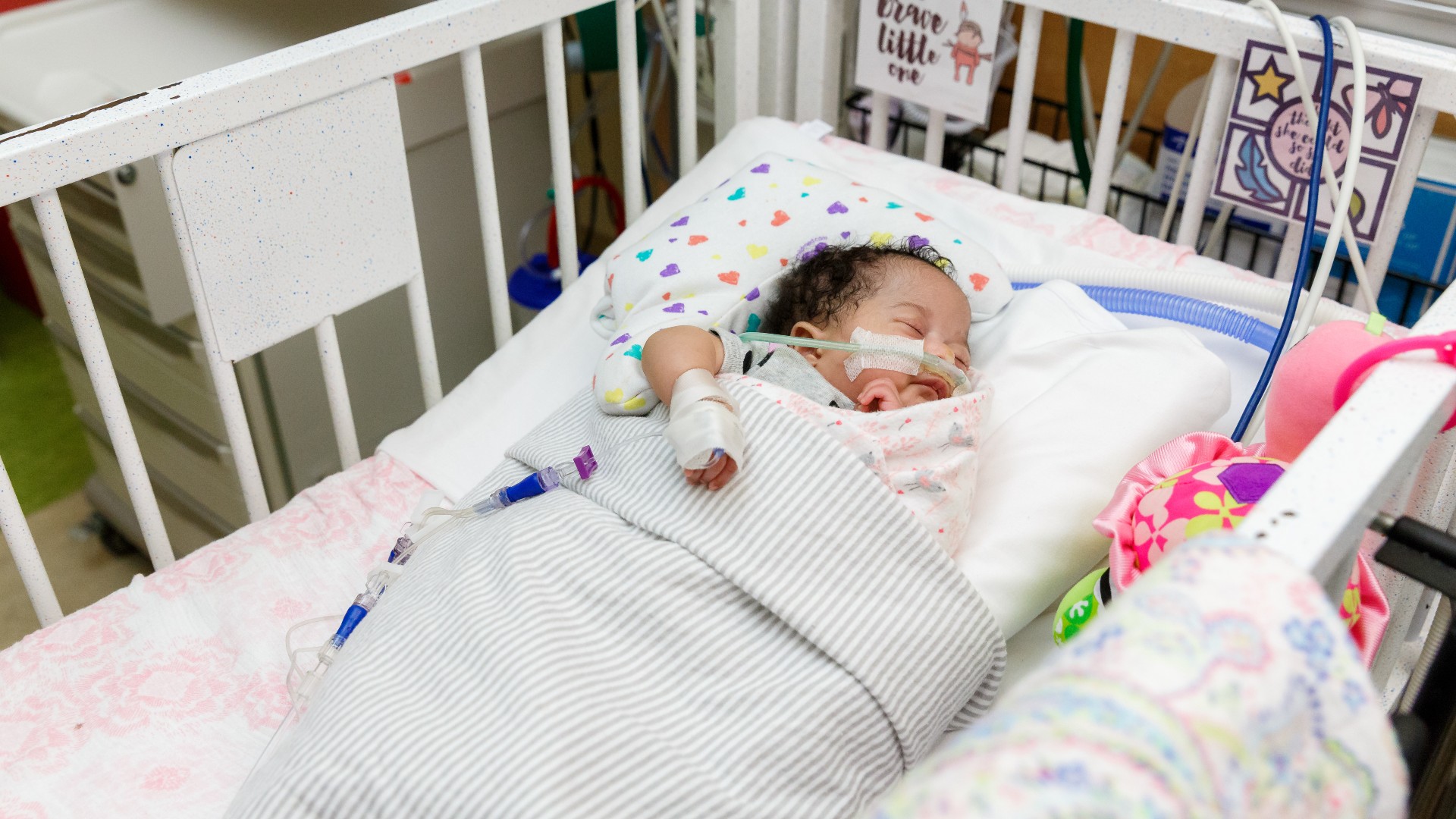
Neonatology
Whether your infant has arrived prematurely or has a critical illness, the top-ranked neonatology team at Children's National Hospital assists in coordinating every service you and your baby need, including consultations, assessments, emergency treatments and continuing care.

Bowel Management Program
The Division of Pediatric Colorectal & Pelvic Reconstruction offers a comprehensive Bowel Management Program that provides customized treatment for children who experience constipation and/or fecal incontinence (the inability to control their bowels). Learn more about our Bowel Management Program.

Gastroenterology, Hepatology and Nutrition
Our gastroenterology specialists provide expert diagnosis and treatments for children with digestive, liver and nutrition disorders.

General and Thoracic Surgery
The General and Thoracic Surgery team offers expert surgical care with minimally invasive techniques for a wide range of conditions in children. Learn more about this department.

Comprehensive Motility Program
The Motility Program works to help treat a number of motility issues impacting your child's digestive tract, including abdominal pain, aspirating, constipation and incontinence. Learn more about our Comprehensive Motility Program.
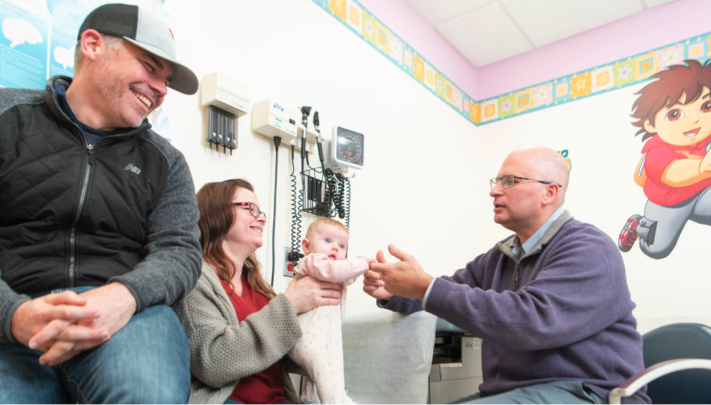
Pediatric Colorectal & Pelvic Reconstruction
The Division of Pediatric Colorectal & Pelvic Reconstruction offers the latest advancements in diagnosis and treatment for all types of pediatric colorectal disorders. Learn more about our division.

Help Kids and Make a Difference
Invest in future cures to help children have brighter futures.







